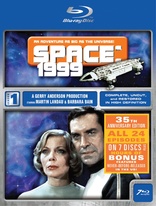Space: 1999 - Season 1 Blu-ray Movie
HomeSpace: 1999 - Season 1 Blu-ray Movie 
A&E Home Video | 1975-1976 | 1248 min | Unrated | Nov 30, 2010Movie rating
7.6 | / 10 |
Blu-ray rating
| Users | 4.5 | |
| Reviewer | 4.0 | |
| Overall | 4.1 |
Overview
Space: 1999 - Season 1 (1975-1976)
In the year 1999, a spectacular explosion at a nuclear waste dump sends the moon out of Earth's orbit.
Starring: Martin Landau, Barbara Bain, Nick Tate, Barry Morse, Catherine SchellDirector: Gerry Anderson, Sylvia Anderson, Charles Crichton, Peter Medak, Tom Clegg (I)
| Sci-Fi | Uncertain |
| Drama | Uncertain |
| Adventure | Uncertain |
Specifications
Video
Video codec: MPEG-4 AVC
Video resolution: 1080p
Aspect ratio: 1.33:1
Original aspect ratio: 1.33:1
Audio
English: DTS 5.1
English: Dolby Digital Mono
Subtitles
None
Discs
50GB Blu-ray Disc
Seven-disc set (5 BDs, 2 DVDs)
Packaging
Slipcover in original pressing
Playback
Region A (C untested)
Review
Rating summary
| Movie | 3.5 | |
| Video | 4.5 | |
| Audio | 4.0 | |
| Extras | 4.0 | |
| Overall | 4.0 |
Space: 1999 - Season 1 Blu-ray Movie Review
This is what happens when you party like it's 1975.
Reviewed by Jeffrey Kauffman December 5, 2010The early to mid-1970s were a tough time for science fiction fans who wanted episodic television fare, not to mention major feature films, to regularly whet their appetite. Lost in Space and Star Trek had long since toddled off the airwaves, and since the glut of cable channels had yet to become a consumer choice, only those fans who were lucky enough to live in a (usually) major market where some old show was syndicated could still get their fix of Kirk, Spock and Bones or, alternatively, the Space Family Robinson. Irwin Allen managed to hang on (just barely) into the 1970s with his short-lived Land of the Giants, before leaving to pursue the disaster film with a vengeance. And though there were fitful successes (sometimes critical, sometimes—though not often—box office) at the cineplex in the sci-fi genre (Westworld, Silent Running), the early to mid-1970s were really a pretty sad era filled with a glut of Planet of the Apes sequels and other films that really were more redolent of B-moves of the late 1950s a lot of the time. And so as strange as it may seem now, though producer-creator Gerry Anderson is probably best remembered for his slate of “Supermarionation” series like Thunderbirds!, Anderson was nonetheless hailed as at least a potential hero by sci-fi fans when he announced what was then a big budget, internationally cast television series called Space: 1999. Would it be another Star Trek? Or more like its campier cousin Lost in Space? How would the still then groundbreaking special effects wizardry of films like 2001: A Space Odyssey influence the look of the series? The fact that Anderson got any PR traction at all on this show is something of a miracle to begin with, as he never sold it to what were in those days the only three venues available, the trio of broadcast networks. Instead Anderson pursued the then revolutionary approach of putting together his own Space: 1999 syndicated network to carry the series. In some markets, that meant major players affiliated with top rated networks, affiliates who actually forsook the network programming to offer Anderson’s series. In many other markets, Space: 1999 was consigned to the independent stations the bulk of whose programming usually consisted in old reruns of canceled network fare.
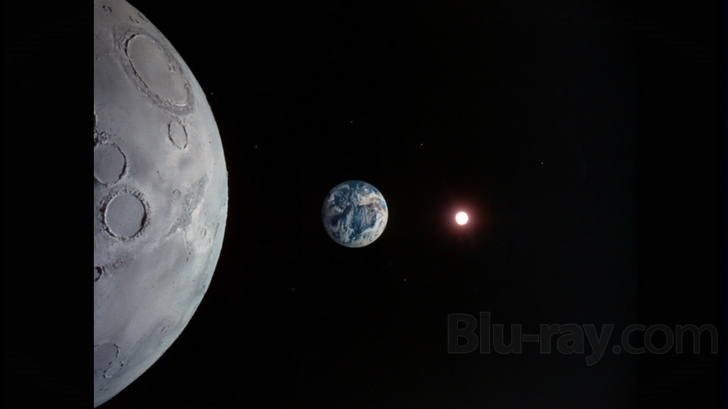
Anderson, in his halting but occasionally informative commentary on “Breakaway,” the series’ pilot episode, makes it clear that Space: 1999 rose from the ashes of Anderson’s first live-action series, UFO. UFO had briefly taken major American markets by storm, but had quickly dwindled in the ratings. In that interim period, a second season (called a “series” in the UK) had been ordered, but when the ratings tanked, everything was put on hold. Anderson was left holding the bag on some big sets and he wanted to get his money’s worth, and for that perhaps atypical reason, Space: 1999 was developed. Martin Landau and Barbara Bain, who had left Mission: Impossible by that time, were brought on board to assure sales in the American market. (It’s somewhat ironic to note that Spock himself, Leonard Nimoy, took over for Landau on Mission: Impossible). The show was going to be a relatively big budget affair, with supposed state of the art special effects, and an “adult” premise which ostensibly would keep it from becoming something like the campfest that Lost in Space had turned into after its initial season.
The reality turned out to be something at least a bit different from the pre-production hopes. Space: 1999 jettisons anything even remotely approaching scientific accuracy by positing that a huge nuclear explosion on the moon catapults Earth’s satellite into the far reaches of deep space, all without actually seriously damaging the orb itself. That of course sets up a colony of earthlings attempting to survive in unknown regions as they try to figure out if and how they can return to Earth, something that obviously mirrors both the previous Lost in Space and, in a way, Battlestar Galactica.
In terms of special effects and production design, Space: 1999 is a maddening combination of excellence and absurdity, almost as if Caligula’s Danilo Donati had collaborated with 2001’s Ernest Archer, Harry Lange and Anthony Masters. The special effects were in fact helmed by one of the crew (albeit uncredited) of 2001: A Space Odyssey, Brian Johnson, who in the series’ breathless press announcements is credited with “creating” 2001’s spectacular effects (which would probably be news to Douglas Trumbull and Kubrick himself). Matte paintings and some of the supposed interstellar work look wonderful, with high contrast footage that may in fact not rise to 2001’s incredible heights, but which are at least pretty good in the annals of episodic 70s television. There’s also a clean and lean look to a lot of the sets and costumes (the main costumes were designed by 1960s topless bathing suit icon Rudi Gernreich). Space: 1999 does look patently silly at times, and that is a result of the injudicious use of miniatures, which frankly often look like they’ve been sucked out of a nearby Supermarionation spectacular, as well as the series’ penchant for coming into contact with unfortunately costumed and made-up aliens, at least one species of which could be considered distant cousins of Saturday Night Live’s Conehead family.
The drama here is often portentous and lugubrious. Anderson and his writing staff seem to mistake slow moving plot lines and wooden dialogue for “adult” scenarios. There’s no denying that Space: 1999 doesn’t devolve into the worst Lost in Space territory, but it similarly fails to rise to Star Trek levels in terms of thoughtfulness. It certainly broaches several interesting ideas, including disposal of nuclear waste and Man’s seeming obsession with “instant” war (a subject also covered in Star Trek), but the molasses-esque pace of the series often tends to drain any excitement and energy out of the proceedings. (In terms of this series' cribbing from Star Trek, listen to how much Space: 1999's computer sounds like Majel Barrett).
What ultimately may sink Space: 1999 for contemporary viewers is the very thing that sold the project to United States markets in the first place, namely the presence of Martin Landau and Barbara Bain. Gerry Anderson’s wife and business partner, Sylvia Anderson, doesn’t hold much back about her dislike for the then-married “star” (at least in their own minds) couple in one of the bounteous extras included in this set. Sylvia in fact never wanted them to begin with, thinking, probably correctly, that Landau simply wasn’t leading man material. The interesting thing about this pair is that they had made their claim to fame (despite Landau’s long career in supporting roles) on Mission: Impossible, a show where the plots always took precedence over the characters, and in fact the characters were usually pretending to be someone else to begin with. Here, hobbled by often patently ridiculous dialogue, Landau and Bain are one of the most curiously sexless star couplings in television history, with a dearth of charisma to match. Sylvia Anderson goes on at great length about Landau’s obsessive need to be in every scene of the show, and his presence may in fact wear on some viewers. Helping to make up for that is an often fine supporting cast, including The Fugitive's Inspector Gerard, Barry Morse, here sporting his original British accent. The guest star list is also great (if often only for its camp value), and includes such names as Christopher Lee and Joan Collins.
Nonetheless, this series has attained its own rather rabid cult fan base, and they will no doubt be thrilled to have this new release. Space: 1999 is an odd little show, there’s no getting around it, but that very peculiarity may be one of its alluring charms for some viewers. American television is often predictable, and, truth be told, so is Space: 1999, but in a very different way than a lot of episodic fare from this side of the pond. The show looks reasonably vivid even now 35 years after its initial broadcast, and though of course Moonbase Alpha hasn’t materialized so far, it’s fun to see what “futurists” from the past thought we might be up to now some 12 years ago.
Space: 1999 - Season 1 Blu-ray Movie, Video Quality 
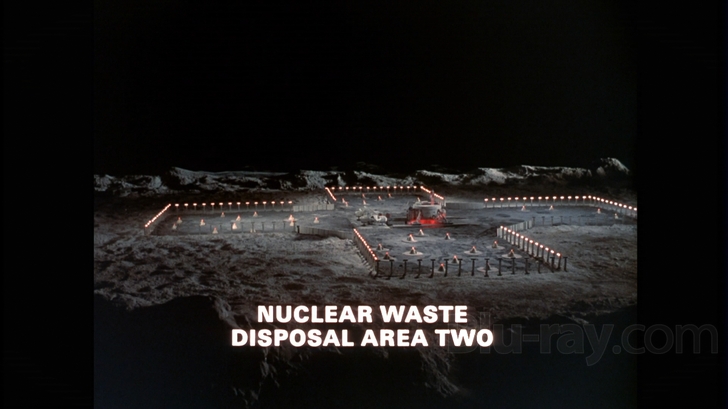
Space: 1999 looks crisp and clean in this new Blu-ray edition, delivered via an AVC codec in its original aspect ratio of 1.33:1 and given a full 1080p transfer. Don't believe everything you read on the internet (except here at Blu-ray.com, of course): this show has not had its aspect ratio tampered with as did A&E's recent release of the 1970s British documentary The World at War. (Some of the supplements on the SD- DVDs are indeed anamorphically enhanced to 16:9, but the original series itself is still resolutely 4:3). The best thing about the image quality here is the color saturation and the incredible black levels. While there is some variation throughout the 24 episodes of this first season, over all the palette is robust and brilliantly displayed here. What may disappoint some modern day viewers not previously acquainted with this series is its penchants toward beiges and whites, but if you look around, there are some wonderfully bright reds, green, blues and greens dotting the landscape, especially in some of the alien worlds the Moonbase Alpha residents visit. The SFX work, aside from some of the unfortunate miniatures, looks very good in hi-def, and the black levels of the outer space segments are reference quality (this show was innovative in its use of high contrast, something that was not the norm for episodic television back then). Sharpness and clarity are very good, though this has a somewhat textureless appearance of video, so the image itself can be "surface only," so to speak, with little filmic depth.
Space: 1999 - Season 1 Blu-ray Movie, Audio Quality 
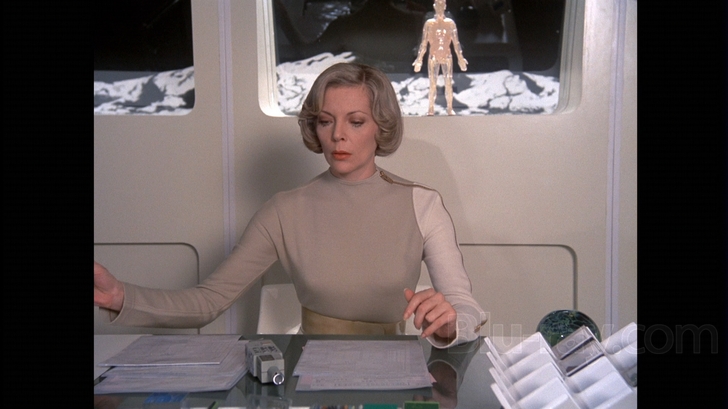
A&E has given us a repurposed 5.1 mix for this new Blu-ray edition of Space: 1999, but it is not a DTS-HD Master Audio 5.1 mix. It is instead a standard DTS 5.1 mix. Truth be told, there isn't stupendous surround activity here for large swaths of any given episode, but when it does appear, it's handled quite nicely. Typically the surrounds come into play in the FX sequences, when a spaceship's whoosh pans through the soundfield. The tubular "horizontal elevator" that our heroes transport themselves around in also has some nice panning effects associated with it. LFE here is very good, with some spectacular explosions occurring in several episodes. Dialogue and underscore are almost always anchored in the front channels and are decently mixed. I have problems with the score to this series anyway, so the less I could hear it, the better I liked the show. There is no noticeable damage on any of the stems used to give us a repurposed 5.1 track, and there's really no egregious compression here despite the age of the original source elements. A&E has provided the original mono tracks for each episode (as well as music only tracks for all but two episodes), albeit in lossy Dolby, but purists may well want to opt for that original experience.
Space: 1999 - Season 1 Blu-ray Movie, Special Features and Extras 
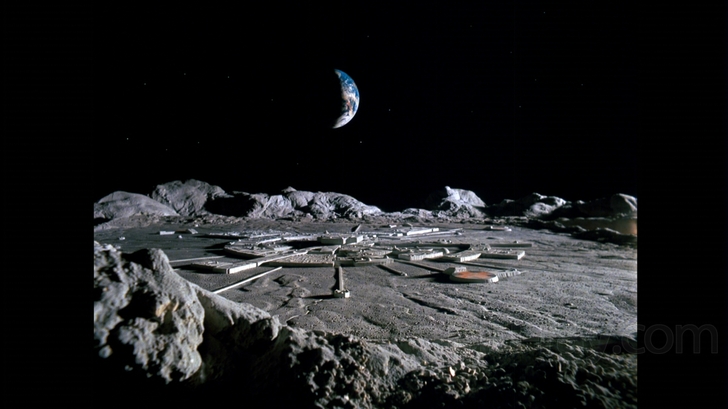
This 7 disc set contains 5 BDs and 2 SD-DVDs, and extras are included on all the discs. For organization's sake, I've broken down the extras into
the different formats:
BDs
- Image Galleries (in HD) on each and every episode.
- Original Mono Tracks (in Dolby) on all episodes.
- Music Only Tracks (in Dolby) on all episodes save for "Breakaway" and "Dragon's Domain"
- HD Restored, Textless Titles
- Gerry Anderson Commentaries on "Breakaway" and "Dragon's Domain"
DVDs
- These Episodes (1:35:18) contain featurettes on selected episodes, with cast and crew interviews.
- Memories of Space (7:16) has more behind the scenes footage and good interviews with production crew.
- Sylvia Anderson Interview (16:13). Me-ow. If you watch no other supplement on this set, take a little over 15 minutes to bask in the warm glow of Anderson's fond remembrances of Landau and Bain. Not. Hilarious and acerbic, this was easily my favorite extra on this set.
- Textless Generic Titles (1:44)
- Concept and Creation (12:38) gives us more background information on the show's production history.
- Special Effects and Design (16:52) has some really interesting information about how the FX shots were created.
- Clapper Board (38:59) is a "reconstructed" vintage television documentary from 1975 which features some great archival footage of Supermarionation series.
- Guardian of Piri Remembered (1:36) is a brief interview with guest star Catherine Schell.
- Barry Gray's Original Theme Demo (1:23), which proves there's nothing like disco science fiction music.
- Alternate Opening and Closing Titles (2:58)
- Landau and Bain US Premier Intro and Outro (1:54) is a short snippet which ran on some U.S. Channel 4 when the show premiered. This has pretty spotty video quality.
- SFX Plates and Deleted SFX Scenes With Music Track (11:41)
- Two Sets of Trailers for recut episodes which appeared as telefilms, "Alien Attack" (3:36) and "Journey through the Black Sun" (1:53).
- Ad Bumpers (00:38)
Space: 1999 - Season 1 Blu-ray Movie, Overall Score and Recommendation 
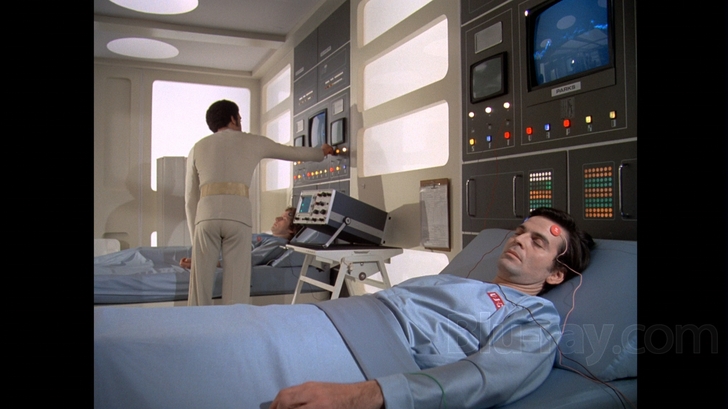
Space: 1999 is not the "thought provoking" classic its most ardent admirers insist it is. It's an often slow moving and portentous series that tried to be the Star Trek of its day, but instead often came closer to Lost in Space territory. Landau and Bain are perhaps too cerebral for a show of this ilk, no matter what its purported ambitions were at the time. Still and all, Space: 1999 boasts an often attractive and at times impressive physical production, and it at least succeeds on a camp level some of the time. Fans of this show will most likely love this new Blu- ray set, which sports an extremely sharp image and bountiful supplements. Those coming to Space: 1999 as neophytes may well echo Landau's great statement from the opening episode, "We're sitting on the biggest bomb mankind has ever made." Well, maybe not the biggest, but don't play with matches around this show. Personally, I'm a sucker for shows that blend the silly with the supposed "thought provoking," in that late- 50s B movie sci-fi sort of way I mentioned above, so Space: 1999 comes Recommended.
Other editions
Space: 1999: Other Seasons
Similar titles
Similar titles you might also like

UFO: The Complete S.H.A.D.O. Files
Import
1970-1971

Battlestar Galactica
The Remastered Collection
1978-1980

Fire Maidens of Outer Space
Fire Maidens from Outer Space / Slipcover in Original Pressing
1956

Interstellar 4K
2014

Doctor Who: Tom Baker - Complete Season Six
1979-1980

Star Trek: Picard - The Complete Series
2020-2023

Ad Astra
2019

Gravity
Includes "Silent Space" version
2013

Star Trek: The Complete Original Series
1966-1969

Blake's 7: The Collection - Series 2
1979

Battlestar Galactica 4K
45th Anniversary Edition
1978

Babylon 5: The Complete Series
1993-1998

When Worlds Collide
1951

Star Trek: Deep Space Nine
1993-1999

Star Trek: Enterprise: The Complete Series
Budget Re-release
2001-2005

Forbidden Planet
Includes "The Invisible Boy" on SD
1956

Star Trek: Voyager
1995-2001

Star Trek: The Motion Picture 4K
The Director's Edition | Remastered
1979

Voyagers
2021

Mission to Mars
2000
